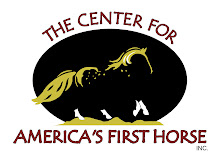Today, the rescue horses from NM will begin their journey east. If all goes well, they should arrive Thursday. The plan is to unload them right into pens in the indoor arena where they will be closely monitored and get settled. Although the horses will have some winter coat, inside the arena they will be warmer and protected from the wind while they recover from their long trip. I am very excited to see the horses again!
The arrival of these horses is a bittersweet event. The Baca family has dispersed their herd. Sixty years of breeding Colonial Spanish horses has now come to an end. It is very sad for the family. The aweful drought and Mr. Baca's failing health has prompted this dispersal. No matter the reason, the herd is seperated.
Just a little history: The Baca Chica farm sits directly on the Camino Real, the first road to carry Spanish explorers. In the late 1500's Don Juan Onate led his people to Inscription rock at El Morro National Monument along this road. The actual road, over 400 years old, is still clearly visible on the Baca property. The horses would often cross this path in their daily meanderings. Sixty years of the Baca family breeding America's first horse produced a unique southwest strain recognized as "critically endangered" by the American Livestock Breeds Conservancy.
The first time I visited the Baca Chica Farm I stood on this dirt path under the ancient cottonwood trees and it was a moving experience. To envision the Spaniards exploring the new world on their little horses, the same type that the Baca Family has preserved, was powerful. I remember that moment clearly.
The dispersal of this herd is more than just relocating some horses. It's the end of an era. Most of the mares are retired from breeding now, a few young ones are still looking for homes, and only 4 stallions of this strain remain. One will be with us in Vermont. One is in Texas, and the Baca's hope to keep two of them on the farm.
In 2005 when my first trailer load of Baca horses arrived in Vermont, (Morado and Ringo were on that load) they were blessed by a Catholic priest before they left. He felt so strongly and often said that these horses were bridging the gap between New Mexico and Vermont. They were here to help educate people about the rich history of New Mexico, the Spaniards, and how important these horses were in shaping America.
Now, 7 years later, as we await the arrival of this small group, the last and finest (in my opinion!) of the Baca horses are arriving at The Center, a facility and organization that was inspired by Adelantado, our first horse from New Mexico.
There are a lot of mixed emotions today. Feeling sad for the Baca's as they watch the last of their horses get loaded, but also so excited to be able to help the horses and care for them, and to provide them a bright future. They are beautiful spirits.We are able to carry on the legacy for the life of these horses, although sadly, I feel it is too late strengthen the gene pool at this point.
If not for the support from people all over the country this would not be happening. We raised almost exactly enough money to cover transport expenses. From here on out we are looking at additional expenses for hay we had not planned on.
Fundraising is not easy. It takes energy, time and committment. It means going out of our comfort zone asking for help. The goal at the Center is to be self sufficient through revenue from our programs and other events. We do not want to rely on private donations forever. We are writing grants and working diligently to raise money. Until then however, we are developing a sponsorship program for these horses exclusively, reaching out to individuals and businesses who are interested in supporting the horses.
As the horses begin their trek, I will be in close touch with Tony from Troja horse transport. I know he will take good care of the precious cargo. I will be blogging daily on their whereabouts and updates.
Thank you everyone for your well wishes. May we continue to serve the horses with your help.
Stephanie
www.centerforamericasfirsthorse.org
Sunday, January 22, 2012
Subscribe to:
Post Comments (Atom)

Beautiful post, mi amiga.
ReplyDelete